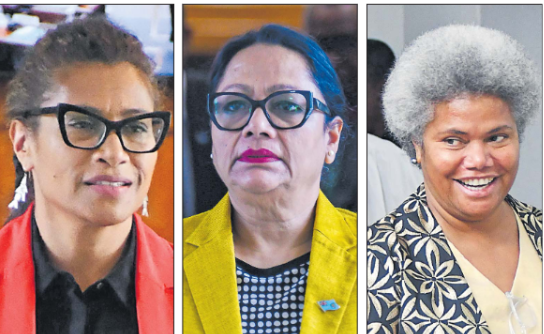Fiji has been praised in a new report released by the Inter Parliamentary Union that examined how Parliaments around the world dealt with sexism, harassment and violence against women in parliaments. Fiji was listed alongside India, the Maldives, the Philippines, the Republic of Korea, Sri Lanka and Thailand as parliaments in the Asia-Pacific which have begun taking steps to prevent and respond to such actions, including by setting up mechanisms for confidential reporting and handling complaints. The report titled Sexism, harassment and violence against women in parliaments in the Asia-Pacific region is based on interviews conducted with 150 women from 33 Asia-Pacific countries, including 85 women parliamentarians and 65 women members of parliamentary staff.
IPU findings in Asia-Pacific region
THE survey revealed online gender-based violence is on the rise, compared to rates reported in previous IPU studies. In total, 60 per cent of the women parliamentarians surveyed have been the target of hate speech, disinformation, image-based abuse or unwanted disclosure of personal data (doxing) online. More than a third of reported cases of intimidation and threats occurred online.
The survey found women parliamentarians belonging to their country’s political opposition report rates of psychological violence that are 24 percentage points higher than for women parliamentarians as a whole, and rates of sexual violence that are 18 percentage points higher.
The survey reveals Parliament is the main environment where women parliamentarians and parliamentary staff experience sexual harassment and sexist behaviour and remarks. Among women parliamentary staff, the alarming rates of sexual and psychological harassment perpetrated overwhelmingly by male parliamentary staff and, to a lesser extent, by parliamentarians, raise questions about the nature of parliament as a workplace.
How Fiji Parliament deals with
complaints
The IPU report states Fiji, India, the Maldives, the Philippines, the Republic of Korea, Sri Lanka and Thailand are taking measures to protect parliamentary staff from harassment by peers. The report states in 2019, the Parliament of Fiji adopted a policy to prevent sexual harassment of parliamentary staff. This policy complies with laws that require employers to take action against harassment.
“Its guiding principles are to provide a safe working environment and ensure that parliamentary staff have an avenue for redress with respect to sexual harassment in the workplace,” states the IPU report.
It provides a clear definition of sexual harassment with extensive examples of its manifestations, said the IPU. It focuses not only on acts of harassment that take place in parliamentary precincts, but also on acts that take place on the occasion of official activities, including official trips, training sessions, workshops, meetings or conferences. “The policy is distributed to all staff and awareness-raising sessions are held to ensure compliance and adherence,” said the IPU.
Members of staff who believe they have been sexually harassed must report the matter to a senior human resources officer, the Sexual Harassment Grievance Officer, using the Sexual Harassment Complaint Form. The IPU adds it is up to victims to decide whether they wish to make a formal or informal complaint.
“If the victim wishes to make a formal complaint, an Investigation Panel will be appointed, consisting of at least three trained members of staff. The investigation process, which should be completed within 14 days, is managed internally by the Parliamentary Secretariat and the final decision rests with the Secretary General.” The IPU report states the nature of the sanctions depends on the gravity and extent of the harassment and may range from a verbal or written warning to dismissal/termination. The Fiji parliament policy states all complaints of sexual harassment will be treated confidentially, which means that information about a case will be handled and shared on a need-to-know basis only and will be kept in a secure location with restricted access.
The IPU states the existence of sexism and violence against women in parliaments is now widely acknowledged and that the data analysed in this report highlights the reality and scale of these issues in parliaments in the Asia-Pacific region, as described by the women who work there.
The study calls for their voices to be heard and for their accounts to be taken seriously, without minimising them. It also underscores the detrimental impact of this structural issue in the region, particularly for advancing the equitable and diverse participation of women in parliament as well as improving the working environment and well-being of parliamentarians and staff, regardless of gender.



